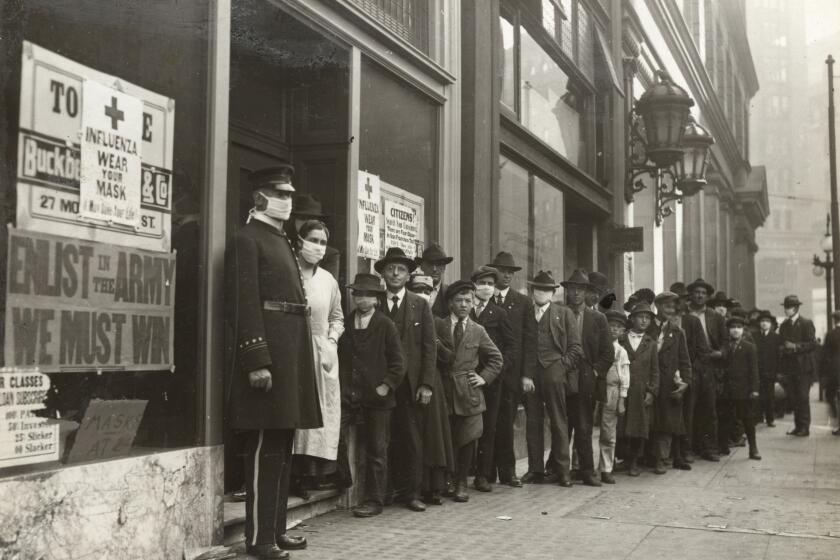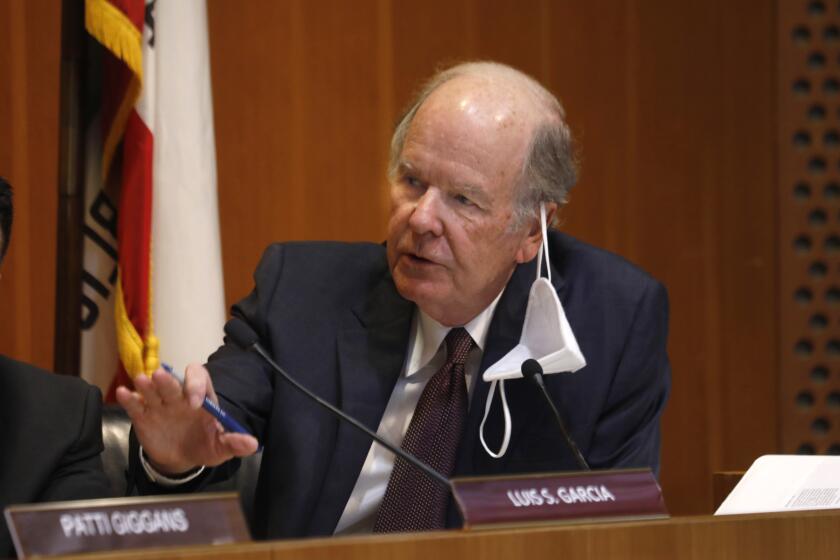London Breed, a mayor who scolds and empathizes, is San Francisco’s face of the coronavirus crisis
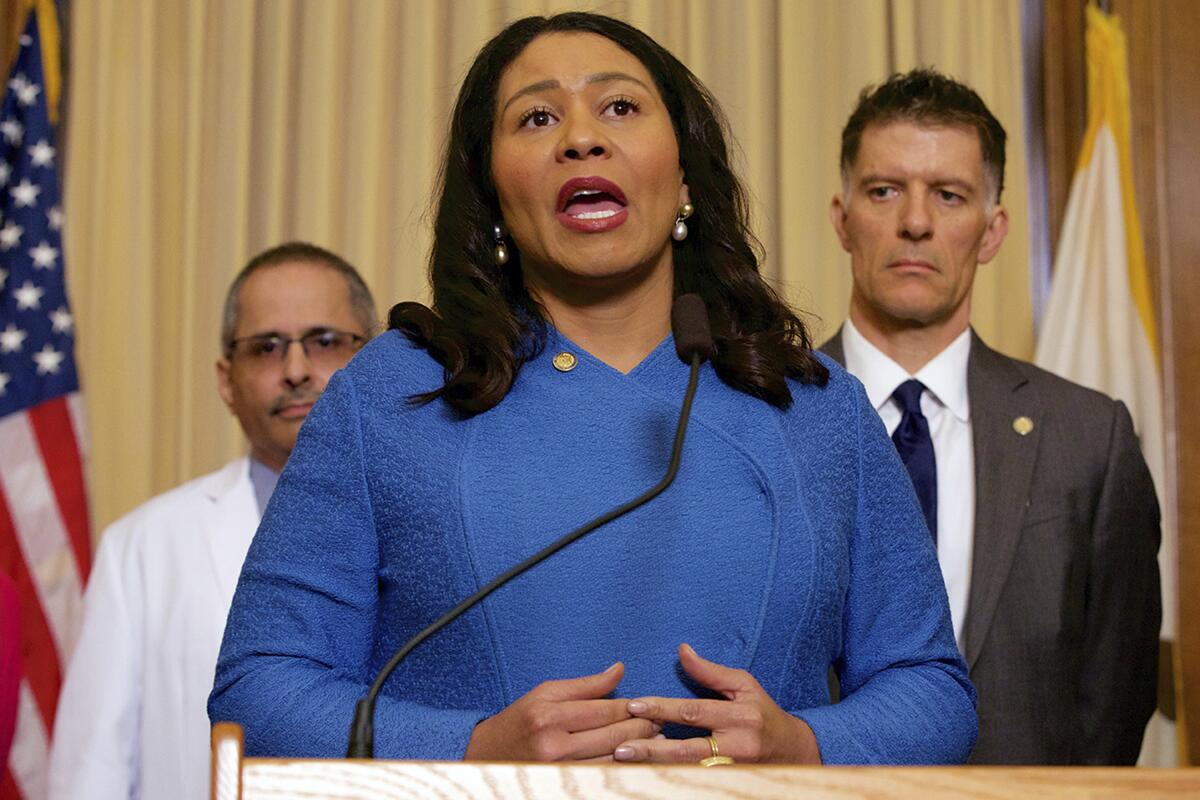
- Share via
SAN FRANCISCO — Mayor London Breed ran into a friend a few weeks ago at the grocery store. As she recounted on an online forum, he rushed to hug her.
“Noooo!” she shrieked, moving back. He told her he had never been sick in his life.
She countered that he could be an asymptomatic carrier of the coronavirus.
“The thing that is making me lose it is people who are not staying away from each other outside,” she said, laughing. “I feel like this is payback for all the problems I gave my grandmother.”
Since early March, Breed has garnered national attention, both for being out in front of the pandemic and playing the role of a reassuring, sometimes scolding, civic leader.
On Feb. 25, before the city had a single confirmed case of coronavirus, Breed declared a state of emergency. The order, issued after similar action by harder-hit Santa Clara County, allowed San Francisco to prepare for the pandemic. In early March, the city banned all mass gatherings of 1,000 or more people, prohibiting fans from heading to Golden State Warriors games at the new Chase Center.
The city’s first female African American mayor, Breed, 45, has been seemingly everywhere during the crisis, usually remotely. She was on CNN again on Saturday night, and has been addressing the media at least three times a week. She’s also been sharing information behind the scenes, fielding calls from mayors nationwide asking about the city’s response.
Nearly each day, she’s applied her powers to changing circumstances. She issued an order putting a lid on how much delivery companies could charge restaurants, helped establish emergency child-care centers for the children of front-line workers, and created a call center for people in isolation or quarantine who need groceries.
Having grown up in poverty and hardship, Breed also has repeatedly let San Franciscans know that she shares their pain.
She interviewed a mental health expert last week on a webinar, asking for tips on how people can cope with the loneliness of isolation. “For me personally,” said the unmarried mayor, “I haven’t had a hug since this thing started.”
Not everyone is thrilled by Breed’s performance. She’s been criticized for making herself the face of the public health response, as opposed to Bay Area health officers. Homeless advocates say the city has been slow to get people off the streets and into hotels.
Yet others credit her for making gutsy decisions, and say her political future has grown brighter in a city known for launching powerful politicians. Both of California’s U.S. senators, Dianne Feinstein and Kamala Harris, hail from San Francisco, as does Gov. Gavin Newsom.
“Who knows what the future will bring,” said Assemblyman David Chiu (D-San Francisco). “But London is focused on the immediate task at hand.... I know she made decisions where there were risks of being seen as overreacting, and she was comfortable with those risks.”
California lessons from the 1918 pandemic: San Francisco dithered; Los Angeles acted and saved lives
San Francisco went mask crazy. Los Angeles shut down early and stayed closed longer, but not long enough. Some lessons from the 1918 Spanish flu.
Breed appears publicly almost every day and seems to adapt her mood to the moment. At times, she is the nagging mother. Stay home! Other times she tries to comfort. We will get through this. She frequently talks about her late grandmother, who raised her and her siblings.
Breed knows that female elected officials are often judged by their appearance. With beauty salons closed, she is on her own. She appears in professional attire during her news conferences, her long wavy hair parted off-center, her lips brightened in red.
“I am good at nails, at lashes and doing my hair and my makeup,” she said in an interview. “When you grow up with nothing, you learn how to do things on your own.”
Sheryl Davis, a longtime friend of Breed, said minorities and the poor “are always worried that somebody is going to use how you look as a judgment.”
Breed grew up in the gritty Plaza East project in San Francisco’s Western Addition, where its residents were stereotyped, Davis said. The public housing was dubbed “OC,” for “out of control.” Police didn’t want to enter it. Coming from the project meant it was important “when you were seen, not to fit the mold of who they thought you were,” Davis said.
Growing up, Breed never learned her father’s identity. She has declined to comment on why her mother was unable to raise her children, other than to dispel a rumor. “She wasn’t on drugs,” Breed said.
Breed, her siblings and grandmother lived in a unit with roaches and plumbing problems. Glassware amounted to recycled jars.
She was only 12 when she lost a friend to violence in the project. She heard the gunshots. She has a brother in prison and lost a sister to an overdose.
Breed graduated from a city public high school, obtained a bachelor’s degree in political science from UC Davis and a master’s in public administration from the University of San Francisco. She started her career working for San Francisco city government. She was elected to the Board of Supervisors in 2012, and her colleagues made her board president in 2015.
When former Mayor Ed Lee unexpectedly died in December 2017, she served briefly as acting major. The supervisors, arguing she could not retain her district seat and still be mayor, voted to replace her with someone else. She ran for mayor in a special election and won, and in 2019 voters reelected her to a full term.
She is considered a moderate in San Francisco as opposed to a progressive, which state Sen. Scott Wiener called “absurd.”
“San Francisco’s political spectrum is left and lefter,” said Wiener (D-San Francisco).
During a blood drive several days ago, Wiener asked Breed to donate for him. Wiener is gay and restricted from donating, a vestige of the AIDS crisis. Breed donned a mask and gave blood, he said.
Wiener described Breed as “the perfect mayor” for this sort of crisis. “She is able to handle stress in a good way,” he said. “She is very good at staying focused on the task at hand and not getting distracted.”
Breed said plans already were underway for a stay-at-home order for San Francisco when the health officers of several Bay Area cities conferred and decided to issue their own.
Unlike elected officials in the other counties, Breed called a news conference to announce the order. “It was not about needing to be the star,” she said.
Even so, some have questioned why she personally announced the restrictions. “She jumped the gun by an hour,” said San Francisco Supervisor Aaron Peskin, a progressive who also is fiscally conservative. “The reality is this was driven by the six chief health officers of the Bay Area, and we should never forget that.”
But Breed said she had good reason to be the face of the order. “When you do announcements of this magnitude, it is so critical that people see the mayor of their city along with their county health officers as partners,” she said.
The Bay Area’s early emergency restrictions are credited for stemming the rate of infection in San Francisco and the region. By Saturday, San Francisco had recorded 20 deaths, while L.A. County, with 11.5 times the population, had logged nearly 29 times as many deaths: 577.
Breed now presides over a city transformed. On Friday, the financial district was deserted. A homeless man slept in a doorway. On the Embarcadero, people walked, ran and roller-skated by the water, but most stayed six feet away from others. Some wore masks and gloves.
On Mission Street, one of the city’s main thoroughfares, a line of people snaked for blocks to pick up orders from a Target store. Two police officers stood by to ensure social distancing. Parking was plentiful at the now closed Civic Center.
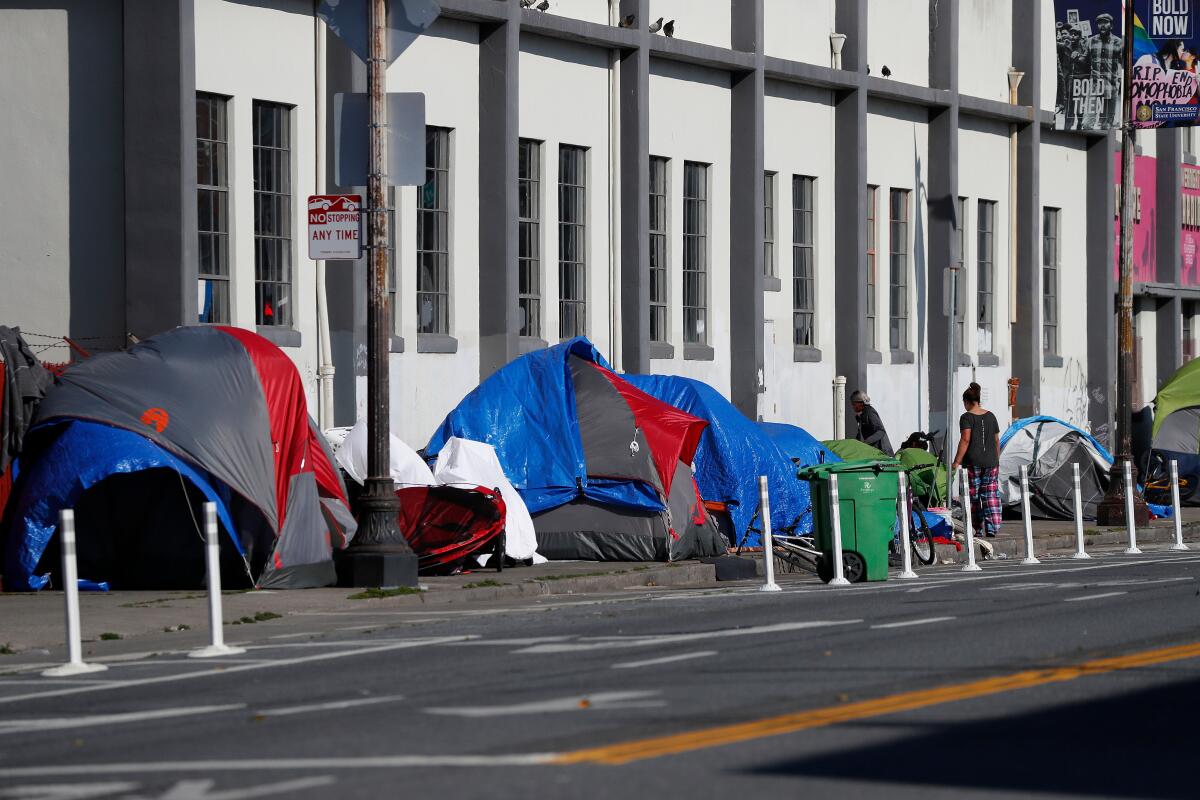
Some homeless advocates and members of the Board of Supervisors have been critical of Breed for not providing more hotel rooms for homeless people, and protecting them in general. On April 10, Breed announced that 70 residents and staff at a homeless shelter had tested positive for the coronavirus.
Breed, frustrated, said the city can ramp up to 7,000 rooms — it now has more than 2,000 — but cannot provide staff to house the 8,200 rooms the supervisors want.
All city employees are now disaster workers, but not all can staff the hotels, she said. Some have children at home. Some are afraid for their health.
Some homeless people won’t wear face coverings or keep six feet apart from others, she said, and some suffer from addiction and other disorders. Some fearful shelter workers have walked out.
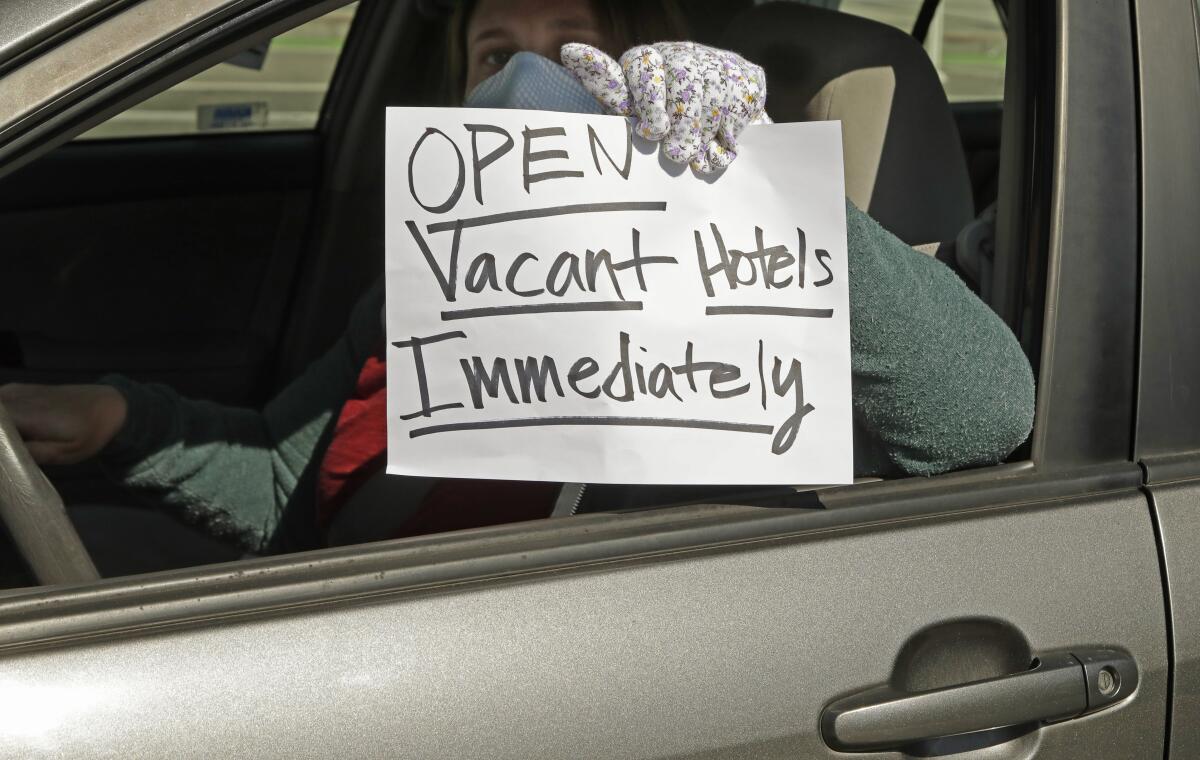
The hotels need security, healthcare workers, social workers and cleaners, and the city has to provide occupants with three meals a day and prescription medicine. Large buses are being used to transport the homeless to hotels to abide by the six-feet distancing requirements. Someone needs to police elevators to ensure that only one person enters at a time.
Because of the health crisis, the city is facing a billion-dollar deficit.
Breed said she takes walks in her neighborhood to deal with stress, drinks a lot of water and gets plenty of sleep. She has not been tested for the coronavirus.
“I am a spiritual person, and I try to focus on the positive, the good,” she said. “We need more love. We need more goodness.”
Just before the pandemic took off, Breed received scrutiny for her 20-year friendship with Mohammed Nuru, the city’s longtime head of public works. The FBI arrested Nuru in January on corruption charges. Breed disclosed she had dated Nuru briefly two decades ago, remained close to his daughters and had allowed him last year to spend about $5,600 on repairs for her car.
“I realize that my close friendship to someone accused of something so serious will undoubtedly affect my life, and maybe even my life’s work,” she wrote in an online posting Feb. 14.
Today, people cheer her when she is spotted.
When California reopens from coronavirus lockdown, Breed’s first stop will be the hair dresser, she recently told a community forum. Then she will get her nails done, put on something pretty, and go dancing to live music.
But that might not happen for a while, she has repeatedly told San Franciscans. If the city opens up too soon, she warned, the virus could rebound, as the Spanish flu did in 1918.
For now, Breed said she is just grateful to be alive.
“I have been through worse in my life,” she said. “I come from nothing, and the fact that I am mayor is unbelievable to me and to the people I grew up with.”
More to Read
Sign up for Essential California
The most important California stories and recommendations in your inbox every morning.
You may occasionally receive promotional content from the Los Angeles Times.
